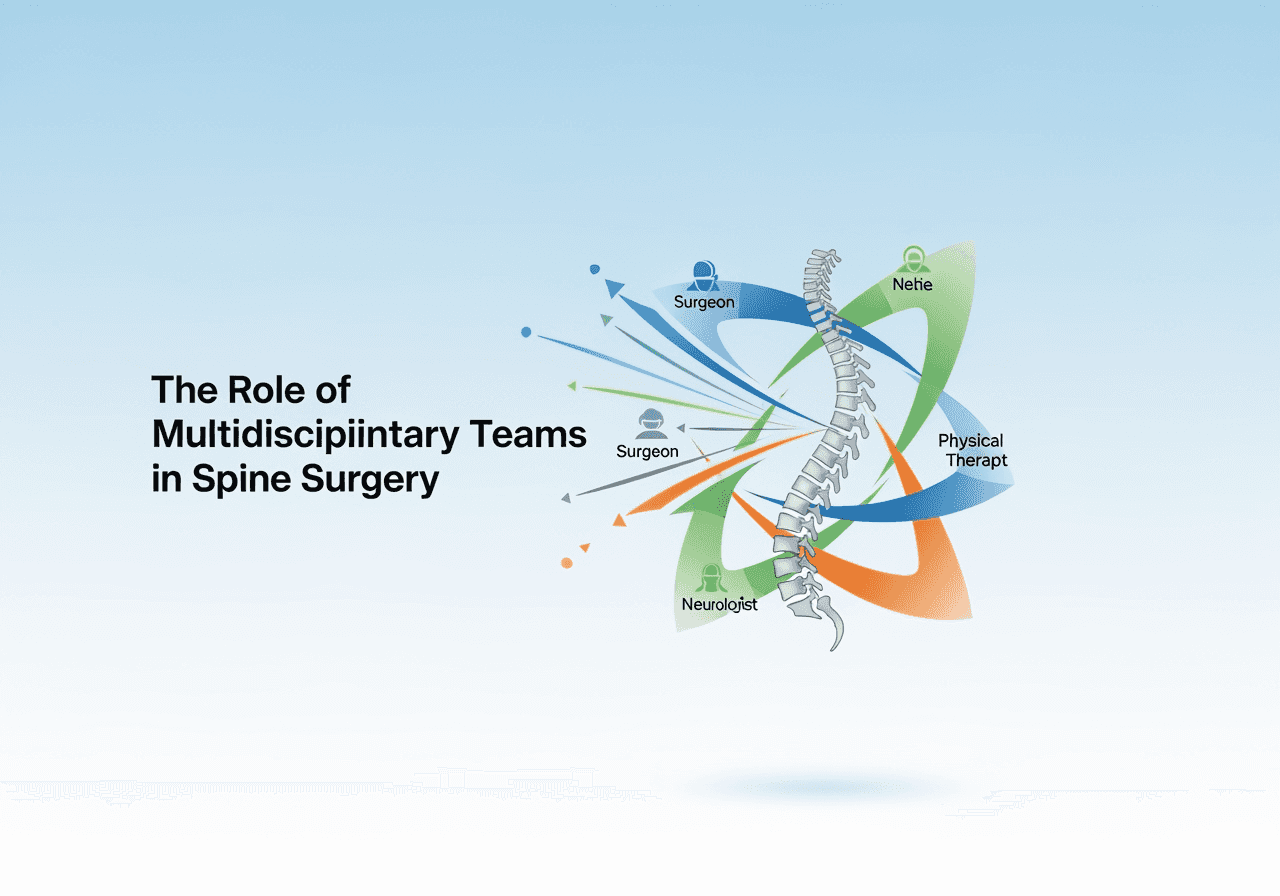
Role of Multidisciplinary Teams in Spine Surgery
14 Oct, 2025
 Healthtrip
Healthtrip- Where Multidisciplinary Teams are Essential in Spine Surgery: A Global Perspective
- Why Multidisciplinary Teams are Crucial for Spine Surgery Success
- Who's on Board? The Composition of a Multidisciplinary Spine Surgery Team
- How Multidisciplinary Teams Function in Spine Surgery: A Step-by-Step Approach mentioning Vejthani Hospital, Bangkok Hospital, Saudi German Hospital Cairo, Egypt
- Real-World Examples: Success Stories of Multidisciplinary Spine Care mentioning Fortis Memorial Research Institute, Gurgaon and Helios Klinikum Erfurt
- Challenges and Solutions in Implementing Multidisciplinary Spine Care
- The Future of Spine Care: The Growing Importance of Multidisciplinary Teams
- Conclusion
The Core Members of the Spine Surgery Team
A robust multidisciplinary spine surgery team typically comprises several key players, each with a distinct role to play. First and foremost is the spine surgeon, the conductor of this medical orchestra, responsible for the surgical procedure itself. But they’re not alone! You’ll also find neurologists who diagnose and manage nerve-related issues, pain management specialists who focus on alleviating discomfort, and radiologists who interpret crucial imaging like MRIs and CT scans. Physiatrists and physical therapists are essential for pre-and post-operative rehabilitation, helping you regain strength and mobility. Nurses provide round-the-clock care and support, while occupational therapists help you adapt to daily activities. Even psychologists or counselors can play a role, addressing the emotional and mental well-being that often accompanies such a significant medical journey. Hospitals like Vejthani Hospital and Yanhee International Hospital in Bangkok boast such comprehensive teams, ensuring that every aspect of your care is addressed. Healthtrip can help you navigate these options, connecting you with the right team for your specific needs.
Most popular procedures in India
The Benefits of a Multidisciplinary Approach
So, why all the fuss about teams? Well, the benefits of a multidisciplinary approach to spine surgery are numerous and significant. Imagine having multiple experts weighing in on your case, providing diverse perspectives and ensuring no stone is left unturned. This collaborative approach leads to more accurate diagnoses, more comprehensive treatment plans, and ultimately, better patient outcomes. Risks and complications are minimized as the team proactively addresses potential issues from various angles. Enhanced communication between specialists ensures a seamless continuum of care, reducing confusion and anxiety for you, the patient. Moreover, a team approach allows for a more personalized treatment plan, tailored to your individual needs and circumstances. For instance, facilities like Saudi German Hospital Cairo, Egypt, and NMC Specialty Hospital, Al Nahda, Dubai, embrace this philosophy, offering coordinated care that addresses not only the physical aspects of your condition, but also the emotional and psychological ones. Healthtrip simplifies the process of finding such patient-centered facilities, making your healthcare journey smoother and more reassuring.
Real-World Examples of Success
The proof, as they say, is in the pudding. And in the world of spine surgery, the "pudding" is tangible evidence of successful outcomes thanks to multidisciplinary teams. Consider a patient with chronic back pain, initially misdiagnosed, who finally found relief after a team of neurologists, pain management specialists, and physical therapists collaborated at Fortis Memorial Research Institute, Gurgaon, to identify the root cause and develop a targeted treatment plan. Or think of a patient recovering from a complex spinal fusion surgery at Max Healthcare Saket, whose rehabilitation was significantly accelerated by the coordinated efforts of physical and occupational therapists, alongside the surgeon and nursing staff. These are not isolated incidents but rather examples of how multidisciplinary teams can transform the lives of spine surgery patients. Healthtrip understands the power of these collaborative approaches and strives to connect you with hospitals and specialists who prioritize teamwork and communication, leading to better, more holistic care.
Wellness Treatments
Give yourself the time to relax
Lowest Prices Guaranteed!

Lowest Prices Guaranteed!
Finding the Right Multidisciplinary Team
Now that you understand the importance of a multidisciplinary approach, the next step is to find the right team for you. This can feel overwhelming, but Healthtrip is here to guide you. Start by researching hospitals known for their comprehensive spine care programs, like LIV Hospital, Istanbul, or Quironsalud Hospital Murcia, in Spain. Look for facilities that emphasize teamwork and collaboration, where specialists from different disciplines work together seamlessly. Don't hesitate to ask questions: inquire about the team's experience, their communication protocols, and their approach to patient-centered care. Online reviews and testimonials can also provide valuable insights. Consider factors such as location, cost, and insurance coverage. Healthtrip's platform offers a convenient way to compare different hospitals and specialists, helping you make an informed decision. Remember, choosing the right multidisciplinary team is an investment in your health and well-being, and Healthtrip is committed to supporting you every step of the way. So, breathe easy, and let us help you find the perfect symphony of experts for your spine surgery journey.
Where Multidisciplinary Teams are Essential in Spine Surgery: A Global Perspective
Spine surgery, a field dedicated to alleviating pain and restoring function related to the intricate network of bones, nerves, and muscles in our backs, is far from a one-person show. It's a complex arena where the expertise of various medical professionals converges, forming what we call a multidisciplinary team. This team-based approach isn't just a nice-to-have; it's absolutely essential for navigating the complexities of spinal conditions and ensuring the best possible outcomes for patients. Think of it like this: you wouldn't trust a single mechanic to rebuild an entire car engine, would you? Similarly, managing spinal issues requires a diverse skill set. From the initial diagnosis to post-operative rehabilitation, a team of specialists working in sync can provide comprehensive care that addresses every facet of a patient's well-being. The global landscape of spine surgery is rapidly evolving, and the adoption of multidisciplinary teams is becoming increasingly widespread. Hospitals and clinics around the world are recognizing the significant benefits of this collaborative approach. Places like Vejthani Hospital in Thailand, known for its commitment to patient-centered care, and Saudi German Hospital Cairo, Egypt, are excellent examples of healthcare facilities embracing this model to deliver exceptional spine care, ensuring that patients receive not just surgical solutions, but holistic care that encompasses their physical, emotional, and psychological needs. This shift towards integrated care underscores the understanding that successful spine surgery is about more than just fixing a problem; it's about improving a patient's overall quality of life.
Why Multidisciplinary Teams are Crucial for Spine Surgery Success
Why are multidisciplinary teams so vital in spine surgery? Well, imagine facing a complex jigsaw puzzle with pieces scattered everywhere. A single person might eventually piece it together, but a team working collaboratively, each focusing on a specific section, would undoubtedly complete the puzzle faster and more efficiently. Spine surgery is much like that puzzle – intricate and demanding. A multidisciplinary team brings a wealth of perspectives and expertise to the table, allowing for a more comprehensive assessment of the patient's condition. Consider the initial diagnosis: a neurosurgeon might identify the structural problem, such as a herniated disc or spinal stenosis, but a pain management specialist can evaluate the patient's pain levels and explore non-surgical options. A physical therapist can assess their functional limitations and develop a pre-operative exercise program to improve their strength and flexibility. This collaborative approach ensures that all aspects of the patient's condition are considered before any decisions are made. Moreover, multidisciplinary teams foster better communication. When specialists from different fields work together, they can share their insights and perspectives, leading to more informed treatment plans. This also helps to avoid potential conflicts or overlaps in care, ensuring that the patient receives the most appropriate and coordinated treatment. The benefits extend beyond the surgical procedure itself. Post-operative rehabilitation is crucial for a successful outcome, and a multidisciplinary team can provide comprehensive support to help the patient recover their function and return to their normal activities. This may involve physical therapy, occupational therapy, pain management, and psychological support. By addressing all of these aspects, a multidisciplinary team can significantly improve the patient's chances of a successful and lasting recovery. It is a synergy that leads to better outcomes, enhanced patient satisfaction, and a more streamlined healthcare journey. This holistic approach is why leading institutions champion this model in spinal care.
Who's on Board? The Composition of a Multidisciplinary Spine Surgery Team
So, who exactly are the key players on this multidisciplinary spine surgery team? It's a diverse group of professionals, each bringing their unique skills and expertise to the table. Think of it as a well-orchestrated symphony, where each instrument plays a crucial role in creating a harmonious outcome. At the heart of the team is typically a spine surgeon or neurosurgeon, who is responsible for performing the surgical procedure. They are the conductors of this orchestra, guiding the team and ensuring that the surgery is performed safely and effectively. However, they are not alone. A pain management specialist is often involved to assess and manage the patient's pain levels, both before and after surgery. They may use a variety of techniques, such as medications, injections, and nerve blocks, to alleviate pain and improve the patient's comfort. Physical therapists are essential for helping patients regain their strength, flexibility, and function after surgery. They develop individualized exercise programs to help patients recover their mobility and return to their normal activities. Occupational therapists may also be involved to help patients adapt to their environment and perform daily tasks. Radiologists play a vital role in diagnosing spinal conditions using imaging techniques such as X-rays, CT scans, and MRI scans. Their expertise is crucial for identifying the underlying cause of the patient's pain and determining the best course of treatment. Nurses are the unsung heroes of the team, providing compassionate care and support to patients throughout their journey. They monitor patients' vital signs, administer medications, and educate patients and their families about their condition and treatment plan. Psychologists or counselors may also be involved to address the emotional and psychological aspects of chronic pain and spinal conditions. They can provide support to patients and their families, helping them cope with the challenges of living with pain and undergoing surgery. Some teams may also include chiropractors, acupuncturists, and other complementary medicine practitioners. The specific composition of the team may vary depending on the individual patient's needs and the resources available at the healthcare facility. Places like Saudi German Hospital Alexandria, Egypt, recognize the importance of assembling a complete team to ensure holistic care.
Also Read:
How Multidisciplinary Teams Function in Spine Surgery: A Step-by-Step Approach
The magic of a multidisciplinary spine team lies not just in its composition, but in how these professionals synchronize their expertise to deliver optimal patient care. Think of it as a perfectly orchestrated symphony, where each instrument (representing a different specialist) plays its unique part, contributing to a harmonious and effective outcome. This collaborative approach is a far cry from the traditional, siloed model of healthcare, where patients often bounce between specialists without a cohesive care plan. At Healthtrip, we understand that navigating complex medical journeys can be daunting, especially when dealing with something as vital as your spine. That's why we champion the multidisciplinary approach, connecting you with hospitals like Vejthani Hospital, Bangkok Hospital, and Saudi German Hospital Cairo, Egypt, which exemplify this holistic model, ensuring every aspect of your spinal health is addressed with precision and care.
The journey typically begins with a comprehensive assessment. This isn't just a quick check-up; it's a deep dive into your medical history, symptoms, and lifestyle. The spine surgeon, often considered the team leader, initiates this process, but they don't work in isolation. They'll consult with neurologists to evaluate nerve function, pain management specialists to assess and alleviate discomfort, and physical therapists to understand your physical capabilities and limitations. Imaging specialists play a crucial role, providing detailed insights into the structural issues affecting your spine. This initial assessment phase is crucial for creating a holistic picture of your condition, ensuring that no detail is overlooked. It’s about understanding the ‘why’ behind your pain and discomfort, not just the ‘where.’ Healthtrip facilitates access to centers with advanced diagnostic capabilities, ensuring accurate and timely assessments, setting the stage for a successful treatment plan.
Based on the comprehensive assessment, the team collaboratively develops a personalized treatment plan. This plan isn't a one-size-fits-all solution; it's carefully tailored to your specific needs, considering the severity of your condition, your overall health, and your personal preferences. The treatment options might include conservative measures like physical therapy, medication, and injections, or surgical interventions if deemed necessary. The team will discuss the pros and cons of each option, ensuring you're fully informed and empowered to make the best decision for your health. This shared decision-making process is a cornerstone of the multidisciplinary approach. It's about respecting your autonomy and ensuring you feel confident and in control throughout your journey with Healthtrip. Hospitals like Vejthani Hospital are renowned for their patient-centric approach, ensuring you're an active participant in every step of the process.
Throughout your treatment, the multidisciplinary team will closely monitor your progress, making adjustments as needed. This continuous evaluation is essential for ensuring the treatment plan remains effective and aligned with your evolving needs. Regular team meetings allow specialists to share updates, discuss any concerns, and collaboratively refine the approach. This dynamic and responsive approach is particularly important for patients undergoing complex spinal surgeries. Post-operative care is just as crucial, often involving physical therapy, pain management, and psychological support. The team works together to ensure a smooth recovery, helping you regain function and improve your quality of life. Healthtrip emphasizes the importance of comprehensive post-operative care, connecting you with resources and support to ensure a successful long-term outcome. The goal is not just to fix the immediate problem but to empower you to live a healthier, more active life, free from chronic pain.
The multidisciplinary team approach, facilitated by Healthtrip, is designed to provide seamless, coordinated care, ensuring you receive the best possible outcome. From initial assessment to post-operative rehabilitation, every aspect of your spinal health is addressed with a personalized and collaborative approach. This model isn't just about treating the spine; it's about caring for the whole person, addressing the physical, emotional, and psychological aspects of your condition. It's about empowering you to take control of your health and live a life free from pain and limitations. By choosing Healthtrip, you're choosing a partner committed to providing access to world-class multidisciplinary spine care, ensuring a smoother, more effective, and ultimately more rewarding healthcare journey.
Real-World Examples: Success Stories of Multidisciplinary Spine Care
The real-world impact of multidisciplinary spine care is best illustrated through the compelling success stories that emerge from hospitals embracing this collaborative model. These stories aren't just statistics; they are testaments to the power of coordinated expertise and patient-centered care. We at Healthtrip believe in showcasing these triumphs to highlight the potential of this approach and to inspire hope in those seeking solutions for their spinal conditions. One such example stems from Fortis Memorial Research Institute, Gurgaon, where a patient suffering from chronic back pain and limited mobility found relief through a tailored treatment plan involving surgeons, pain specialists, and physiotherapists. The coordinated efforts resulted in reduced pain, improved mobility, and a significantly enhanced quality of life. These stories underscore the transformative potential of integrated care, which Healthtrip is dedicated to connecting patients with.
Another compelling example comes from Helios Klinikum Erfurt, where a patient with a complex spinal deformity underwent a successful corrective surgery followed by intensive rehabilitation. The multidisciplinary team, including orthopedic surgeons, neurologists, and rehabilitation specialists, worked in perfect harmony to ensure a positive outcome. The patient not only regained spinal alignment but also experienced a significant reduction in pain and improved neurological function. This case highlights the importance of a holistic approach that addresses both the structural and functional aspects of spinal health. Healthtrip strives to provide access to hospitals that prioritize such comprehensive care, ensuring patients receive the best possible chance for recovery and improved well-being.
These success stories share a common thread: a patient-centered approach, collaborative decision-making, and a commitment to holistic care. The multidisciplinary team works together to develop a personalized treatment plan that addresses the unique needs of each individual. This plan may involve a combination of surgical and non-surgical interventions, as well as lifestyle modifications and psychological support. The team closely monitors the patient's progress throughout the treatment process, making adjustments as needed to ensure optimal outcomes. Healthtrip understands that every patient's journey is unique, which is why we connect you with hospitals that offer personalized care and support.
Beyond individual success stories, there are broader trends that demonstrate the effectiveness of multidisciplinary spine care. Studies have shown that this approach can lead to reduced pain levels, improved functional outcomes, and increased patient satisfaction. It can also help to reduce the need for surgery and minimize the risk of complications. By showcasing these success stories and the evidence-based benefits of multidisciplinary spine care, Healthtrip aims to empower patients to make informed decisions about their health and to seek out the best possible care for their spinal conditions. We believe that everyone deserves access to quality healthcare, and we are committed to connecting you with the resources and support you need to achieve your health goals.
Ultimately, the success of multidisciplinary spine care lies in its ability to address the complex and multifaceted nature of spinal conditions. By bringing together a team of experts with diverse skills and perspectives, this approach can provide a more comprehensive and effective solution than traditional, siloed care. As Healthtrip continues to advocate for this model, we are confident that more patients will experience the transformative benefits of integrated and patient-centered spine care, leading to healthier and more fulfilling lives.
Also Read:
Challenges and Solutions in Implementing Multidisciplinary Spine Care
While the benefits of multidisciplinary spine care are undeniable, implementing this approach can come with its own set of hurdles. These challenges often stem from logistical complexities, communication barriers, and differing perspectives among team members. However, recognizing these obstacles and proactively implementing solutions is crucial for ensuring the successful delivery of coordinated and patient-centered care. At Healthtrip, we understand that navigating these challenges requires a strategic and collaborative approach, which is why we work with hospitals to streamline their processes and foster effective communication within their multidisciplinary teams. One common challenge is coordinating schedules and facilitating seamless communication between various specialists. Doctors, physiotherapists, psychologists and other specialists each have their clinics and timings, to align things could be challenging.
One of the primary challenges lies in establishing effective communication channels between team members. Siloed communication can lead to fragmented care and potentially compromise patient outcomes. To overcome this, hospitals need to invest in robust communication systems, such as shared electronic health records, regular team meetings, and secure messaging platforms. These tools facilitate the seamless exchange of information, ensuring that all team members are on the same page and aware of the patient's progress and any emerging concerns. Moreover, fostering a culture of open communication and mutual respect is essential. Encouraging team members to actively listen to each other's perspectives and to engage in constructive dialogue can help to bridge any gaps in understanding and promote collaborative decision-making. Healthtrip emphasizes the importance of transparent and efficient communication, connecting patients with hospitals that prioritize these aspects of care.
Another challenge arises from the potential for conflicting opinions or treatment approaches among team members. Each specialist brings their unique expertise and perspective to the table, and occasionally, these viewpoints may diverge. To mitigate this risk, it's crucial to establish clear guidelines and protocols for treatment decision-making. These guidelines should be based on evidence-based practice and should prioritize the patient's best interests. Furthermore, the team leader, typically the spine surgeon, plays a crucial role in facilitating consensus and ensuring that all voices are heard. The team leader should encourage open discussion, weigh the pros and cons of each approach, and ultimately guide the team towards a unified treatment plan. Healthtrip believes in empowering patients to be active participants in these discussions, ensuring that their preferences and values are taken into account.
Financial barriers can also hinder the implementation of multidisciplinary spine care. This approach often requires additional resources, such as dedicated team coordinators, specialized equipment, and extended consultation times. Hospitals need to develop sustainable funding models that support these investments. This may involve seeking grants, negotiating bundled payment arrangements with insurers, or reallocating resources from other areas. Furthermore, it's essential to demonstrate the cost-effectiveness of multidisciplinary spine care by tracking patient outcomes and quantifying the benefits in terms of reduced hospital readmissions, lower healthcare costs, and improved quality of life. Healthtrip works with healthcare providers to promote value-based care, ensuring that patients receive the most effective and affordable treatments.
Overcoming these challenges requires a commitment to collaboration, innovation, and continuous improvement. By investing in effective communication systems, establishing clear treatment guidelines, addressing financial barriers, and fostering a culture of teamwork, hospitals can successfully implement multidisciplinary spine care and deliver exceptional patient outcomes. Healthtrip is dedicated to supporting these efforts, connecting patients with hospitals that are committed to providing comprehensive and coordinated spinal care. We believe that everyone deserves access to the best possible care, and we are committed to helping you navigate the complexities of the healthcare system and find the right solutions for your needs.
The Future of Spine Care: The Growing Importance of Multidisciplinary Teams
Looking ahead, the future of spine care is inextricably linked to the continued expansion and refinement of multidisciplinary teams. As medical knowledge advances and treatment options become more sophisticated, the need for coordinated expertise will only intensify. The days of isolated specialists working in silos are numbered. The future belongs to collaborative, patient-centered teams that can address the complex and multifaceted nature of spinal conditions. At Healthtrip, we are committed to staying at the forefront of this evolution, connecting patients with hospitals that are embracing innovative models of care and driving the future of spine health.
One key trend is the increasing integration of technology into multidisciplinary spine care. Telemedicine, for example, is enabling remote consultations and monitoring, expanding access to care for patients in rural or underserved areas. Wearable sensors and mobile apps are providing real-time data on patient activity levels, pain symptoms, and treatment adherence, allowing for more personalized and responsive interventions. Artificial intelligence and machine learning are being used to analyze large datasets and identify patterns that can inform treatment decisions and predict patient outcomes. These technological advancements are empowering multidisciplinary teams to deliver more efficient, effective, and patient-centered care. Healthtrip is committed to leveraging these technologies to enhance the patient experience and improve access to quality spine care.
Another important trend is the growing emphasis on preventative care and early intervention. Rather than waiting for spinal problems to become severe, healthcare providers are increasingly focused on identifying risk factors and implementing strategies to prevent or delay the onset of pain and disability. This may involve educating patients about proper posture, ergonomics, and exercise, as well as providing early treatment for minor injuries or conditions. Multidisciplinary teams play a crucial role in these preventative efforts, working together to develop and implement comprehensive wellness programs that promote spinal health. Healthtrip recognizes the importance of preventative care and is committed to connecting patients with resources and information that can help them maintain a healthy spine.
Furthermore, the future of spine care will likely see a greater emphasis on patient empowerment and shared decision-making. Patients are no longer passive recipients of care; they are active participants in the treatment process. Multidisciplinary teams need to engage patients in open and honest conversations about their treatment options, risks, and benefits, and they need to respect patient preferences and values. This collaborative approach fosters trust and empowers patients to make informed decisions about their health. Healthtrip is committed to promoting patient empowerment, providing you with the information and resources necessary to take control of your spinal health.
In conclusion, the future of spine care is bright, with multidisciplinary teams leading the way towards more innovative, personalized, and patient-centered care. As technology advances, preventative strategies become more refined, and patient empowerment takes center stage, we can expect to see significant improvements in the lives of those affected by spinal conditions. Healthtrip is dedicated to staying at the forefront of these developments, connecting you with the best possible resources and support to achieve your health goals and live a life free from spinal pain and limitations.
Also Read:
Conclusion
In summary, the journey through spine care reveals a clear and compelling narrative: multidisciplinary teams are not just a trend, but a fundamental shift towards more effective, patient-centered treatment. From the initial assessment to rehabilitation, the collaboration of surgeons, neurologists, pain specialists, and physical therapists ensures a holistic approach that addresses the complexities of spinal conditions. Success stories from institutions like Fortis Memorial Research Institute, Gurgaon and Helios Klinikum Erfurt highlight the tangible benefits of this integrated care model, showcasing improved outcomes and enhanced quality of life for patients. Healthtrip is committed to facilitating access to these advanced care models, ensuring that you receive the best possible treatment for your spinal health.
While challenges such as communication barriers and logistical complexities exist, proactive solutions are paramount. Investing in robust communication systems, establishing clear treatment guidelines, and fostering a culture of teamwork are crucial steps in overcoming these hurdles. As technology continues to evolve, telemedicine, wearable sensors, and artificial intelligence will further enhance the capabilities of multidisciplinary teams, making spine care more accessible, personalized, and efficient. Healthtrip strives to connect you with healthcare providers who are embracing these innovations, ensuring that you benefit from the latest advancements in spine care.
Looking ahead, the future of spine care is inextricably linked to the continued growth and refinement of multidisciplinary teams. A greater emphasis on preventative care, early intervention, and patient empowerment will further transform the landscape, leading to improved outcomes and a higher quality of life for those affected by spinal conditions. Healthtrip is dedicated to supporting these advancements, providing you with the resources and information you need to make informed decisions about your health and to access the best possible care. Whether you are seeking treatment for chronic back pain, a spinal deformity, or a traumatic injury, we are here to guide you on your journey towards a healthier, more active, and pain-free life. You can explore hospitals and treatments at Healthtrip via this link
Related Blogs

Top 5 Indian Hospitals for Neuro Surgery
Detailed guide on neuro surgery, featuring doctors, hospitals, risks, recovery,

Post-Neuro Surgery Diet and Lifestyle Tips
Detailed guide on neuro surgery, featuring doctors, hospitals, risks, recovery,

Common Risks in Neuro Surgery and How Healthtrip Manages Them
Detailed guide on neuro surgery, featuring doctors, hospitals, risks, recovery,

Is Neuro Surgery Right for You? Healthtrip Explains Evaluation Steps
Detailed guide on neuro surgery, featuring doctors, hospitals, risks, recovery,

Role of Multidisciplinary Teams in Neuro Surgery
Detailed guide on neuro surgery, featuring doctors, hospitals, risks, recovery,

Healthtrip's Trusted Hospitals for International Neuro Surgery Patients
Detailed guide on neuro surgery, featuring doctors, hospitals, risks, recovery,










